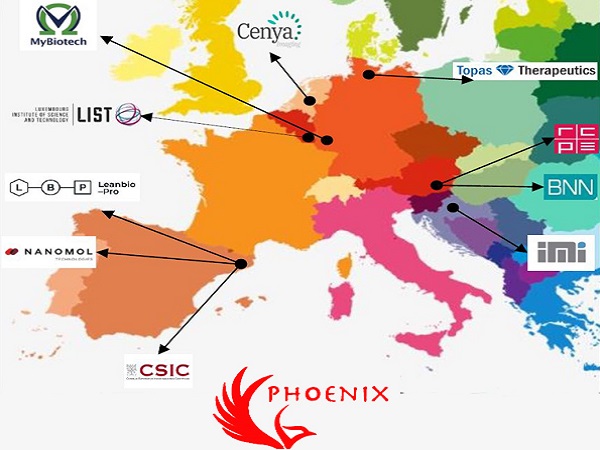 Credit: LIST
Credit: LIST
Eleven project partners from academia and industry across Europe have joined forces on the "PHOENIX" project to create an “Open Innovation Test Bed” for nano-pharmaceuticals; the Luxembourg Institute of Science and Technology (LIST) will coordinate the project in the Grand Duchy.
PHOENIX is an innovation project funded by European Union’s (EU) Horizon2020 Framework Programme and it aims to provide services for the development, characterisation, testing, safety assessment, scale-up, good manufacturing practices (GMP) production and commercialisation of nano-pharmaceuticals to the market, making them available to small and medium-sized enterprises (SMEs), start-ups, research laboratories and other interested users.
The project is coordinated by Dr Tommaso Serchi at LIST and supported by Dr Nazende Günday-Türeliat (for scientific coordination) at MyBiotech near Saarbrücken in Germany. PHOENIX will have a duration of 48 months starting on 1 March 2021 with a total budget of €14.45 million and a requested EU contribution of €11.1 million.
Nano-pharmaceuticals are drugs that use nanotechnology (the use of matter on an atomic, molecular and supramolecular scale for industrial purposes) in some form. This could be in the sense that the drugs themselves are nanomaterials. For example, contrast agents are used in the form of nanoparticles rather than a molecule because nanoparticles are more stable and can stay longer in blood. According to LIST, nano-pharmaceuticals have the potential to drive the scientific and technological uplift, offering clinical and socioeconomic benefits to society in general, as well as industry, key stakeholders and patients. Nevertheless, affordable and advanced testing, manufacturing facilities and services for novel nano-pharmaceuticals are main prerequisites for successful implementation of these advances to further enhance the growth and innovation capacity.
The establishment of current good manufacturing practice (cGMP) in nano-pharmaceutical production on a large scale is considered the key step to successfully transferring nano-pharmaceuticals from bench to bedside (from lab to industrial scale). Due to the lack of resources to implement GMP manufacturing at site, the upscaling and production of innovative nano-pharmaceuticals remains challenging for the main players of the EU nanomedicine market, start-ups and SMEs. To allow successful implementation of the nano-pharmaceuticals in the nanomedicine field, researchers see an urgent need to establish a science and regulatory-based Open Innovation Test Bed (OITB).
The PHOENIX project aims to enable the seamless, timely and cost-effective transfer of nano-pharmaceuticals from lab bench to clinical trials by providing the necessary advanced, affordable and easily accessible PHOENIX-OITB which will offer a consolidated network of facilities, technologies, services and expertise for all the technology transfer aspects from characterisation, testing and verification to scale up, GMP compliant manufacturing and regulatory guidance.
PHOENIX-OITB will develop and establish new facilities and upgrade existing ones to make them available to SMEs, starts-up and research laboratories for scale-up, GMP production and testing of nano-pharmaceuticals. The services and expertise provided by the OITB will include production and characterisation under GMP conditions, safety evaluation, regulatory compliance and commercialisation boost.
The eleven partners that form the PHOENIX consortium are:
- LIST, a Research and Technology Organisation (RTO) from Luxembourg – Project coordinator
- MyBiotech, an SME from Germany – Project scientific coordinator
- Nanomol Technologies SL, an SME from Spain
- LeanBio SL, an SME from Spain
- BioNanoNet Forschungsgesellschaft mbH (BNN), an RTO from Austria
- Agencia Estatal Consejo Superior de Investigaciones Científicas (CSIC – two distinct institutes are involved: CSIC-INMA and CSIC-ICMAB), an RTO from Spain
- Institute for Medical Research and Occupational Health (IMROH), an RTO from Croatia
- Research Center Pharmaceutical Engineering GmbH (RCPE), an RTO from Austria
- Cenya Imaging B.V., an SME from the Netherlands
- Topas Therapeutics GmbH, an industry from Germany
- Grace Bio SL, an SME from Spain
Further information about PHOENIX can be found on the Horizon 2020
website.
 Credit: LIST
Credit: LIST
 Credit: LIST
Credit: LIST








